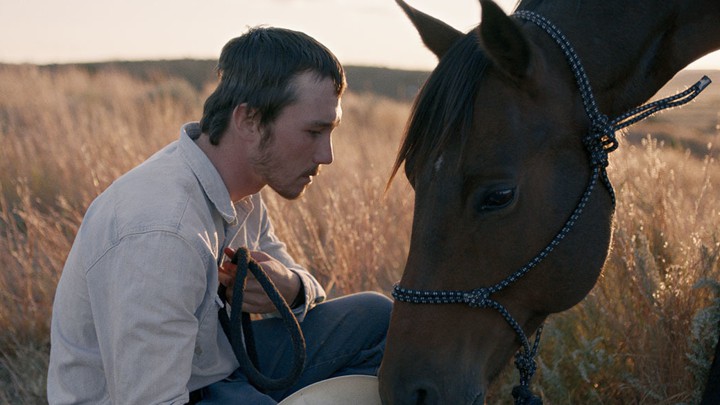After gathering tremendous momentum on its gallop around the festival circuit over the past 18 months, Chloé Zhao's The Rider hit a brick wall in UK audiences upon its theatrical release last September, and I wonder if - as with the similarly underseen American Animals, itself debuting on DVD this week - the problem lies with the fact one could fit nary a cigarette paper between its definitions of fiction and reality. The game of parsing what within a film is strictly documentary and what has been ever so slightly dramatised may be a luxury best enjoyed by those with the time and money to ride the festival gravy train; cinemagoers who wanted to know exactly what they'd be getting from the movies they were paying to see instead gravitated towards Crazy Rich Asians and The Nun, their titles' promises bound to be more completely fulfilled. Tracing over the contours of a story that has already been played out in real life - that of rodeo rider Brady Jandreau (here cast, so the end titles inform us, as the character of "Brady Blackburn"), joined in the early stages of a recovery that demanded he rethink his career path - The Rider delivers ample equestrian activity, but often feels a rough ride, coming out of the gate bucking and jolting. Here are scenes you tell yourself cannot be documentary (for the camera sits in the right place to greet people entering a room), but which nevertheless fill up with "characters" giving the most awkward and tentative line readings, as people tend to do in real life.
For a long time, Zhao's film plays like an advert for the advantages to be gained from employing professionally trained actors, rather than simply asking non-pros to "play" themselves. The nadir is a scene where Brady wakes up to let in an associate, oblivious to the fact his sister (who has severe learning difficulties) has stuck gold stars to his torso while he dozed: the gag is that he only realises once said associate points them out, but the "gosh, darn it" look our boy gives in the aftermath is less convincing than those coaxed out of the doofuses in any third-rate ad campaign, leaving the scene with an oddly muffed punchline. No-one appears especially psyched to be standing in front of the camera, and there's a tired quality to some of the responses, a reaction either to Zhao's desire to turn already-lived life into art, or to the multiple takes required to get something usable in the can. I spent much of the first half baffled as to why my colleagues had fallen so hard for something this slender and inchoate, that at every turn felt more sketch than picture. Possibly it has something to do with its romanticised Americana: its widescreen sunsets, its cowboys who actually sing songs around campfires. With his careful stubble, and his headscar covered by a stetson, Jandreau has a smalltown parking-lot handsomeness that certainly isn't diminished by the many scenes shot around the magic hour. Possibly critics just really like horses. The most stirring scenes here are those that announce themselves, uncomplicatedly, as documentary, offering the mesmeric sight of Jandreau breaking in an unruly steed by whispering in its ear or taking up the reins - scenes where Zhao has plainly asked her subject to physically do something, rather than stop to think about what he's doing.
Contrast these with the sequences where he's been asked to interact with a fellow human being, with lights, camera and the expectations of a film crew trained upon him: here, Jandreau more often than not appears terribly self-conscious, exposed. Yet the more one sees of this, the more one realises how that vulnerability is important to Zhao, and to the film. What my colleagues may have been responding to more than anything is the gesture The Rider makes towards a new approach to the Western, one that throws out the troublesome old politics, replaces the man's-gotta-do swagger with uncertainty (what's this kid gonna do?), and swaps the saddlebags for scars and tattoos, physical forms of baggage. For the arguably toxic, quick-draw masculinity of a John Wayne, Zhao gives us a cowboy who cries. (Brady, we should note, still carries a pistol; it's just he can't bring himself to pull the trigger when the situation calls for it.) There are losses in this substitution process. Zhao's rethink deprives the Western of some of its foursquare heft, the pleasure of knowing exactly what territory we're passing through; it also nudges the genre into the realms of the theoretical, and critics are bound to feel more comfortable there than most audiences. What the film eventually gets to is a slight charm, a vague poignancy, a quiet power - a place where a simple nod of the head can apparently mean the world to somebody. I just wonder whether it would have achieved a lot more if, from the off, its frames hadn't been filled with people who approached the camera as if this were their very first rodeo.
The Rider is available on DVD through Altitude.

No comments:
Post a Comment